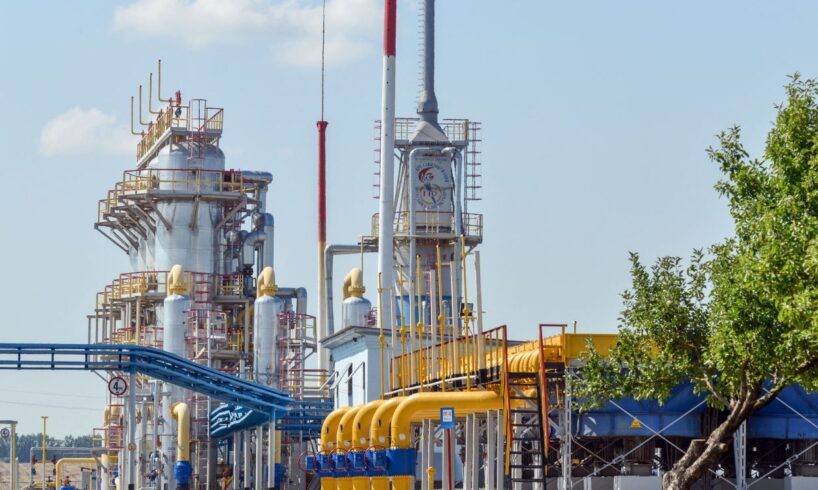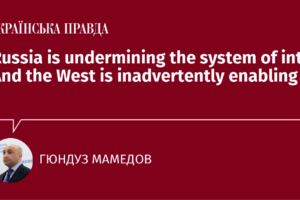
The European Bank for Reconstruction and Development will provide Ukraine’s state-run oil and gas giant Naftogaz with fresh financing for emergency gas imports amid devastating Russian strikes on its gas production facilities, the bank’s vice president told the Kyiv Independent in an interview on Oct. 9.
Nearly 60% of the country’s gas production was damaged in recent strikes, which targeted Ukraine’s Poltava and Kharkiv oblasts, Bloomberg reported on Oct. 9, citing sources with knowledge of the matter.
Naftogaz and Ukraine’s Energy Ministry did not confirm the damage to the Kyiv Independent. Naftogaz did say, however, that the recent strikes were as bad as attacks in February and March. Those attacks led to a loss of nearly 50% of its gas production, the company said then.
The EBRD program, which is currently in the works, needs to be up and running in the next two months for Ukraine to be able to import enough gas for the winter, Matteo Patrone, the bank’s VP, said. Patrone declined to publicly comment on how much funding would be provided, as the bank is still running the numbers.
The bank recently provided the oil and gas giant with a 500-million-euro package in August — its largest project ever in Ukraine — after reserves dropped to an 11-year low in May.
Ukraine needs at least 13.2 billion cubic meters (bcm) of gas to heat homes, schools, hospitals, and businesses this heating season. Before the latest attacks upturned its winter strategy, Naftogaz had planned to import 5.8 bcm by the end of the year, with nearly 4.6 bcm purchased already, the company’s press service told the Kyiv Independent.
Ukrainian state-owned bank Oschadbank signed a 3 billion hryvnia ($72 million) loan with Naftogaz for gas imports on Oct. 9. The European Investment Bank allotted 300 million euros ($347 million) to shore up reserves on Oct. 1.
“We stand ready to lead this effort, but it has to be a collective effort. International partners and the Ukrainian banking system have to step up. We all need to contribute,” Patrone said.
With the right support from the domestic financial sector and international partners, there will be enough gas in the system to get through the winter, he said.
Blackouts in Russia fair response if Moscow targets Ukraine’s grid, Zelensky says
Zelensky also highlighted that Ukraine’s drone strikes on Russian oil refineries have created a gasoline deficit approaching 20%, contributing to shortages in parts of Russia and Russian-held areas.
Russia largely focused its campaign last year on power plants, wiping out half of its power generation capacity. Moscow began major attacks on Ukraine’s gas production at the start of 2025, coinciding with Kyiv’s decision to end Russian gas transit to Europe through Ukraine.
Ukraine’s largest private energy company DTEK’s production sites have been attacked at least three times this year, the company’s press service told the Kyiv Independent.
The embattled country needs to increase gas imports by 30%, although this will depend on how quickly Ukrainian gas production can be restored and if Russia continues its strikes, Energy Minister Svitlana Hrynchuk said on Oct. 7. The faster production is fixed, the less Ukraine will have to rely on imports, she added.
The timeframe to repair energy equipment varies widely. Naftogaz has not said exactly what was damaged. Fixing a gas pipeline may only take a few days, while repairing some types of production equipment can take half a year or more.
Ukraine may have to spend nearly 2 billion euros ($2.3 billion) to import as much as 4.4 bcm by the end of March, Bloomberg reported, citing sources with knowledge of the matter. The country could be forced to pay premium prices in February and March when demand peaks and availability on the European market shrinks, former Energy Minister Oleksiy Orzhel told the Kyiv Independent.
Ukraine hasn’t confirmed yet where exactly it will import this gas from. Naftogaz told Politico that it plans to increase liquefied natural gas deliveries from the U.S. Kyiv could also purchase gas on the spot market from Norway, Qatar, and Azerbaijan, said Viktoriia Voitsitska, energy expert and supervisory board member of We Build Ukraine, a think tank.
Under the new package, the EBRD will hold an open competition from its pool of pre-qualified gas suppliers under its procurement rules, Patrone said. The bank will not provide funding for new equipment, although Ukraine’s Energy Ministry urged other partners, including the G7 nations, to help with equipment during a meeting on Oct. 7.
In a worst-case scenario, there will be more attacks on both production and compression station infrastructure, used to keep gas flowing through pipelines, Patrone said. The bank will be ready to work on further support with Ukraine if that is the case, he added.
“We were not planning to work on another transaction this year. But here we are. This is the reality of the energy security in the country,” he said.
Ukraine strikes Russian gas and oil facilities in Volgograd Oblast, military says
Explosions and fires were reported at both the Korobkovsky Gas Processing Plant in Kotovo and the Yefimovka Linear-Production Dispatch Station, the military said.





